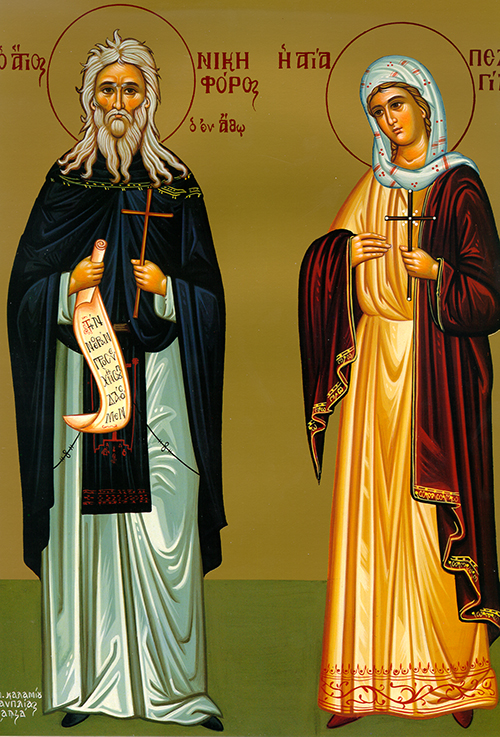

The holy martyr Pelagia of Tarsus in Cilicia (southeastern Asia Minor) lived in the third century during the reign of Diocletian (284-305), and was the daughter of illustrious pagans. When she heard about Jesus Christ from her Christian friends, she believed in Him and desired to preserve her virginity, dedicating her whole life to the Lord. Diocletian sentenced Pelagia to be burned in a red-hot bronze bull. Not permitting the executioners to touch her body, the holy martyr signed herself with the Sign of the Cross, and went into the bronze bull and her flesh melted like myrrh, filling the whole city with fragrance. St. Pelagia’s bones remained unharmed and were removed by the pagans to a place outside the city. Four lions came out of the wilderness and sat around the bones letting neither bird nor wild beast get at them. The lions protected the relics of the saint until Bishop Linus came to that place and gathered them all up and buried the relics with honor. Later, a church was built over her holy relics.
O Jesus, your lamb Pelagia cries out to You with great love: O my Bridegroom, I long for You in great pain. I am crucified with You, and in baptism I am buried with You. I suffer for your sake in order to reign with You. I die for You in order to live in You. Accept me as an immaculate victim since I am immolated for your love. Through her intercession, O merciful One, save our souls.
Having inflamed your soul with love of Christ, you entered the boiling pot with courage. You became a sacrifice of pleasing aroma to the Lord. Today we remember you, O wise Pelagia, and we sing to you.
Acts 10: 34-43
In those days, Peter proceeded to address (the friends and family of Cornelius) in these words: “I begin to see how true it is that God shows no partiality. Rather, the man of any nation who fears God and acts uprightly is acceptable to him. This is the message he has sent to the sons of Israel, the good news of peace proclaimed through Jesus Christ who is Lord of all. I take it you know what has been reported all over Judea about Jesus of Nazareth, beginning in Galilee with the baptism John preached; of the way God anointed him with the Holy Spirit and power. He went about doing good works and healing all who were in the grip of the devil, and God was with him. We are witnesses to all that he did in the land of the Jews and in Jerusalem. They killed him, finally, hanging him on a tree, only to have God raise him up on the third day and grant that he be seen, not by all, but only by such witnesses as had been chosen beforehand by God–by us who ate and drank with him after he rose from the dead. He commissioned us to preach to the people and to bear witness that he is the one set apart by God as judge of the living and the dead. To him all the prophets testify, saying that everyone who believes in him has forgiveness of sins through his name.”
John 8: 12-20
The Lord said to the people coming to him: “I am the light of the world. No follower of mine shall ever walk in darkness; no, he shall possess the light of life.”
This caused the Pharisees to break in with: “You are your own witness. Such testimony cannot be valid.” Jesus answered: “What if I am my own witness? My testimony is valid nonetheless, because I know where I came from and where I am going; you know neither the one nor the other. You pass judgment according to appearances but I pass judgment on no man. Even if I do judge, that judgment of mine is valid because I am not alone: I have at my side the One who sent me – the Father. It is laid down in your law that evidence given by two persons is valid. I am one of those testifying in my behalf, the Father who sent me is the other.”
They pressed him: “And where is this ‘Father’ of yours?” Jesus replied: “You know neither me nor my Father. If you knew me, you would know my Father too.” He spoke these words while teaching at the temple treasury. Still, he went unapprehended, because his hour had not yet come.
Icon courtesy of Jack Figel, Eastern Christian Publications – ecpubs.com
Wednesday, May 3 –